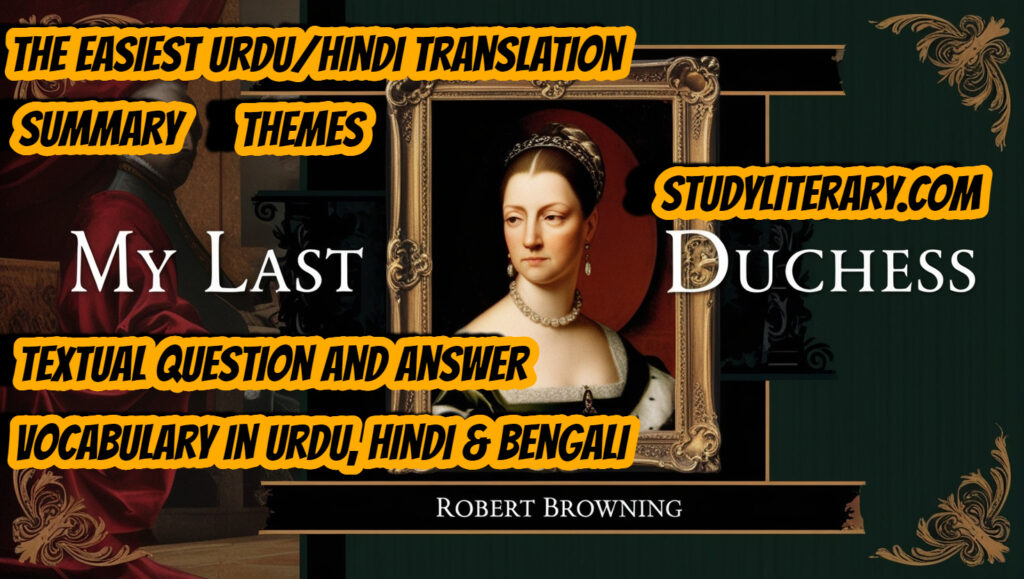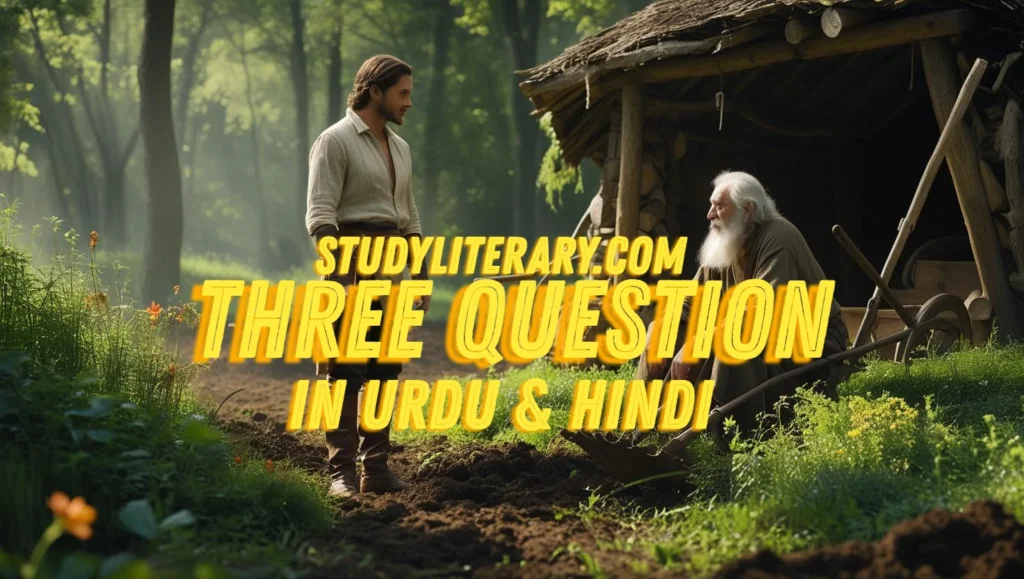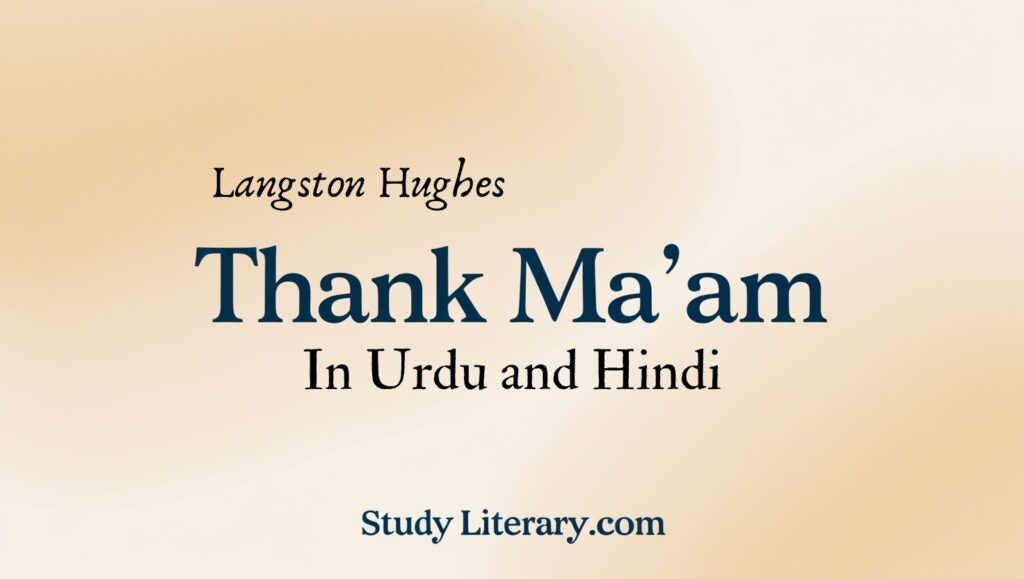That’s my last Duchess painted on the wall,
Yeh meri aakhri Rani ki tasveer/chitr diwaar par hai,
Looking as if she were alive. I call
Aisa lag raha hai jaise wo zinda ho.
That piece a wonder, now; Fra Pandolf’s hands
Worked busily a day, and there she stands.
Main ab is tasveer/chitr ko ek chamatkaar kehta hoon;
Fra Pandolf ke haathon ne ek din mein isay banaya, aur ab wo yahan khadi hai.
Will’t please you sit and look at her? I said
“Fra Pandolf” by design, for never read
Kya aap baithe kar isay dekhna pasand karenge?
Maine jaan bujh kar “Fra Pandolf” ka zikar/ullekh kiya, kyunki kabhi kisi ne ais ki khubsoorti ko dhyan se nahi dekha
Strangers like you that pictured countenance,
Koi ajnabi aap ki tarah is tasveer/chitr ka chehra nahi samajhta,
The depth and passion of its earnest glance,
Us nigah/nazro ki gehrai aur jazbaat/bhaavanaen ko nahi samajhta,
But to myself they turned (since none puts by
Lekin wo sab mujh se poochhtay (kyun ke koi aur nahi
The curtain I have drawn for you, but I)
Woh parda hata sakta jise main ne sirf aap ke liye uthaya hai, bas main hi ause hata sakta hu)
And seemed as they would ask me, if they durst,
Aur lagta tha jaise wo mujh se poochhna chahte hoon, agar himmat karte,
How such a glance came there; so, not the first
Ke yeh jhalak wahan kaise aayi; tou aap pehle insaan nahi hain,
Are you to turn and ask thus. Sir, ’twas not
Jo mujh se aise sawal karna chate hain. Janab, yeh aisa nahi tha
Her husband’s presence only, called that spot
Of joy into the Duchess’ cheek; perhaps
Fra Pandolf chanced to say, “Her mantle laps
Over my lady’s wrist too much,” or “Paint
Must never hope to reproduce the faint
Ke sirf uske shauhar/pati ki mojoodgi ne uske gaal par khushi ki jhalak/rung laaya, shayad
Fra Pandolf ne kaha ho, “Unka dupatta unke haath par zyada lapeta hua hai,”
Ya “rang kabhi is halki si jhalak ko dobarah paish/upasthit nahi kar sakta
Half-flush that dies along her throat.” Such stuff
Jo uss ke gaaly par halki si jhalak deti hai.” Yeh sab
Was courtesy, she thought, and cause enough
For calling up that spot of joy. She had
A heart—how shall I say?— too soon made glad,
Too easily impressed; she liked whate’er
She looked on, and her looks went everywhere.
Uss ke khayaal mein bas, uske liye adab/saahity tha
Aur yeh kaafi tha aus k khushi ka sabab/kaaran bana k liye. Aus k pass jo
Dil tha —kaise kahoon?—bohat jaldi khush ho jaata tha,
Bohat asaani se mutasir/prabhaavit ho jaata tha; jo kuch dekhti thi pasand karti thi, aur uski nazar har taraf jaati thi.
Sir, ’twas all one! My favour at her breast,
Janab, sab kuch us ke liye barabar tha! meri mohabbat uss ke dil ke qareeb
The dropping of the daylight in the West,
Sham ke waqt dhoop ka dhalna,
The bough of cherries some officious fool
Bagh mein kisi bewaqoof ne laal cherries ki daali/shaakha tor di thi,
Broke in the orchard for her, the white mule
Jo uske liye tha, aur wo safed gada,
She rode with round the terrace—all and each
Jis par wo chhat ke chakkar lagati thi—sab ke sab,
Would draw from her alike the approving speech
Uski taraf se ek jaisa tasleem/manzuri ka izhaar milta,
Or blush, at least. She thanked men—good! but thanked
Ya kam se kam uske gaal lal ho jaate. Wo mardon/aadamee ka shukriya ada/dhanyavaad karti thi—achha!
Somehow—I know not how—as if she ranked
My gift of a nine-hundred-years-old name
Magar kisi tarah—main nahi jaanta kaise—jaise wo mere khandan ke nau so saal purane naam ko Mere tuhfa ke barabar samajhti ho.
With anybody’s gift. Who’d stoop to blame
This sort of trifling? Even had you skill
In speech—which I have not—to make your will
Quite clear to such an one, and say, “Just this
Or that in you disgusts me; here you miss,
Kisi aur ke tuhfa ke barabar samajhti ho. Kaun aisi
Aisi chhoti baat par ilzaam/aarop lagayega? Agar aap ko baat karne ka hunar/kaushal ho
—Jo mujhe nahi—ke aap apni baat ko wazeh/spasht kar sakein,
Aur keh sakein, “Yeh ya wo cheez tumhare andar mujhe pasand nahi,”
Or there exceed the mark”—and if she let
Ya “tum wahan had se barh gayi ho”—aur agar usne
Herself be lessoned so, nor plainly set
Apne aap ko samajhne diya, aur khul kar meri baat maan li
Her wits to yours, forsooth, and made excuse—
Aur apni akal ko mere saamne nahi rakha, aur koi bahaana nahi banaya—
E’en then would be some stooping; and I choose
Never to stoop. Oh, sir, she smiled, no doubt,
Phir bhi yeh ek jhukaav hota; aur main
Kabhi jhukna pasand nahi karta. Haan, janab/mahoday, wo muskurati thi, is mein koi shak nahi,
Whene’er I passed her; but who passed without
Jab kabhi main uske paas se guzarta; magar aur kaun guzarta jise usi tarah ki muskurahat nahi milti?
Much the same smile? This grew; I gave commands;
Sabko wahi muskurahat milti thi. Yeh hadd se barh gaya; maine hukm diya;
Then all smiles stopped together. There she stands
Phir sab muskurahatain ek saath ruk gayin. Ab wo wahan khadi hai
As if alive. Will’t please you rise? We’ll meet
The company below, then. I repeat,
Jaise zinda ho. Aap uthna pasand karenge? Hum
Neeche sab logon se milenge. Main dobara keh raha hoon,
The Count your master’s known munificence
Is ample warrant that no just pretense
Of mine for dowry will be disallowed;
Aap ke aaqa/maalik ka mushhoor darya dili/udaarata
Mere maangne par kisi bhi jaayaz ki maang ko rad/mana nahi kiya jaayega;
Though his fair daughter’s self, as I avowed
Jab ke uski khoobsurat beti hi, jaisa maine kaha tha
At starting, is my object. Nay, we’ll go
Shuru mein, mera maqsad/uddeshy hai. Nahi, hum saath chalenge
Together down, sir. Notice Neptune, though,
Saath neeche chalenge, janab. Magar dekhiye Neptune (Roman god of sea) ko,
Taming a sea-horse, thought a rarity,
Jo ek samundri ghode ko shaant kar raha hai, yeh ek rare cheez thi,
Which Claus of Innsbruck cast in bronze for me!
Jo Claus of Innsbruck ne mere liye bronze mein banaya tha!
Summary
The poem “My Last Duchess” is about a Duke who is showing a painting of his late wife (the Duchess) to a visitor. The painting is hung on a wall, and the Duke talks about her as if she is still alive. He explains that a famous artist, Fra Pandolf, painted her, and he hints that she used to smile a lot in a way that made him jealous.
The Duke says that the Duchess was too friendly and easily pleased by everything she saw — whether it was a small gift, the sunset, or something someone did for her. She would blush and smile for everyone, which made the Duke angry because he felt she didn’t value his 900-year-old family name more than she valued other small things.
Instead of talking to her about this, the Duke “gave commands,” and after that, she stopped smiling altogether. It’s implied that he ordered her death, though he never says it directly. Now, she is only a painting on the wall, and the Duke seems to be in full control of her.
At the end of the poem, the Duke and the visitor leave the room to talk about the Duke’s next marriage. He is planning to marry the daughter of a powerful Count and is more interested in the dowry (money or property given during the marriage) than in the woman herself.
Main theme of the poem
The poem shows how the Duke’s pride and ego lead him to destroy what he cannot control. The Duchess, a symbol of beauty and innocence, becomes another one of his possessions, reduced to a mere painting.
- Power and Control: The Duke is obsessed with controlling others, especially the Duchess, even after her death.
- Jealousy and Possessiveness: He resented the Duchess for being too friendly and open, wanting her admiration only for himself.
- Objectification of People: The Duke treats people, especially women, like objects or possessions that he can control, much like the painting and the bronze statue.
Vocabulary of the text
| Word/Phrase | Urdu Meaning | Hindi Meaning | Bengali Meaning |
|---|---|---|---|
| Duchess | شہزادی، رانی (Shahzadi, Rani) | रानी, डचेस (Rani, Duchess) | ডাচেস, রাজকুমারী (Duchess, Rajkumari) |
| Ferrara | اٹلی کا ایک شہر (Italy ka aik sheher) | इटली का एक शहर (Italy ka ek sheher) | ইতালির একটি শহর (Italir ekti shoher) |
| Painted | مصور کیا ہوا (Tasveer kia hua) | चित्रित किया (Chitrit kiya) | আঁকা (Anka) |
| Alive | زندہ (Zinda) | जीवित (Jeevit) | জীবিত (Jibito) |
| Wonder | حیرت انگیز (Herat angez) | आश्चर्य (Aashcharya) | বিস্ময়কর (Bismoykor) |
| Hands | ہاتھ (Haath) | हाथ (Haath) | হাত (Haath) |
| Stands | کھڑی ہے (Khari hai) | खड़ी है (Khadi hai) | দাঁড়িয়ে আছে (Dariye ache) |
| Glance | نظر، نظرِ کرم (Nazar, Nazar-e-Karam) | नजर, दृष्टि (Nazar, Drishti) | দৃষ্টি, নজর (Drishti, Nojor) |
| Passion | جذبات، جوش (Jazbaat, Josh) | जुनून, भावनाएँ (Junoon, Bhawnayein) | আবেগ, উত্তেজনা (Aabeg, Utejona) |
| Cheek | گال (Gaal) | गाल (Gaal) | গাল (Gaal) |
| Mantle | چادر، اوڑھنی (Chadar, Odhni) | ओढ़नी, चादर (Odhni, Chadar) | চাদর, ওড়না (Chadar, Orna) |
| Blush | شرم سے لالی آنا (Sharm se Laali aana) | शरम से लाली आना (Sharam se Laali aana) | লজ্জায় লাল হওয়া (Lojjay lal howa) |
| Heart | دل (Dil) | दिल (Dil) | হৃদয় (Hriday) |
| Glad | خوش (Khush) | खुश (Khush) | আনন্দিত (Anondito) |
| Impressed | متاثر (Mutasir) | प्रभावित (Prabhavit) | মুগ্ধ (Mugddho) |
| Looks | نظریں، دیکھنا (Nazrein, Dekhna) | नजरें, देखना (Nazrein, Dekhna) | দৃষ্টি, দেখা (Drishti, Dekha) |
| Cherries | چیری، ایک قسم کا پھل (Cherry, aik qism ka phal) | चेरी, फल (Cherry, Phal) | চেরি, ফল (Cherry, Phal) |
| Mule | خچر (Khachar) | खच्चर (Khacchar) | খচ্চর (Khacchar) |
| Terrace | چھت (Chhat) | छत (Chhat) | ছাদ (Chad) |
| Approving Speech | پسندیدگی کا اظہار (Pasandidegi ka izhaar) | प्रशंसा, अनुमोदन (Prashansa, Anumodan) | সম্মতি সূচক কথা (Shomoti suchok kotha) |
| Commands | احکام، حکم دینا (Ahkaam, Hukam dena) | आदेश, हुक्म देना (Aadesh, Hukm dena) | আদেশ, হুকুম দেওয়া (Adesh, Hukumer dewa) |
| Stooping | جھکنا (Jhukna) | झुकना (Jhukna) | নত হওয়া (Not howa) |
| Dowry | جہیز (Jahez) | दहेज (Dahej) | যৌতুক (Jotuk) |
| Bronze | کانسی (Kansi) | कांस्य (Kansya) | ব্রোঞ্জ (Bronze) |
| Neptune | سمندر کے خدا کا نام (Samundar ke khuda ka naam) | समुद्र के देवता (Samudra ke Devta) | সমুদ্রের দেবতা (Shomudrer debota) |
| Rare | نایاب، قیمتی (Nayaab, Qeemti) | दुर्लभ, कीमती (Durlabh, Keemti) | বিরল, মূল্যবান (Biral, Mullyoban) |
| Fra | مذہبی خطاب (Mazhabi khitaab, Father) | धार्मिक उपाधि (Dharmik Upadhi, Father) | ধর্মীয় উপাধি (Dhormiyo Upadhi, Father) |
| Pandolf | مصور کا نام (Musawir ka naam, Artist) | एक चित्रकार का नाम (Ek chitrakar ka naam) | একজন চিত্রশিল্পীর নাম (Ekjon chitrashilpir naam) |
| Countenance | چہرہ، شکل و صورت (Chehra, Shakal-o-Surat) | चेहरा, मुखाकृति (Chehra, Mukhaakriti) | মুখমণ্ডল, মুখাবয়ব (Mukhomondol, Mukhaboyob) |
| Depth | گہرائی (Gehrayi) | गहराई (Gehrayi) | গভীরতা (Govirtha) |
| Earnest | سنجیدہ، مخلص (Sanjeeda, Mukhlis) | गंभीर, ईमानदार (Gambhir, Imaandar) | আন্তরিক, গম্ভীর (Antorik, Gambhir) |
| Durst | ہمت کرنا (Himmat karna) | साहस करना (Sahas karna) | সাহস করা (Sahos kora) |
| Spot of Joy | خوشی کا نشان (Khushi ka nishan) | आनंद का चिन्ह (Anand ka chinh) | আনন্দের দাগ (Anonder dag) |
| Laps | لپیٹنا (Lapetna) | लपेटना (Lapetna) | জড়িয়ে দেওয়া (Joriyiye dewa) |
| Faint | ہلکا، مدھم (Halka, Madhum) | हल्का, मंद (Halka, Mand) | হালকা, মৃদু (Halka, Mridu) |
| Flush | لالی، سرخی (Laali, Surkhi) | लाली, लालिमा (Laali, Lalima) | লাল হওয়া (Lal howa) |
| Courtesy | شائستگی، ادب (Shaistagi, Adab) | शिष्टाचार, विनम्रता (Shishtachar, Vinamrata) | ভদ্রতা, শিষ্টাচার (Bhodrota, Shishtachar) |
| Approving Speech | پسندیدگی کا اظہار (Pasandidegi ka izhaar) | अनुमोदक वाक्य (Anumodak vaakya) | অনুমোদনকারী কথা (Onumodon kari kotha) |
| Officious Fool | مداخلت کرنے والا بیوقوف (Mudakhlat karne wala bewaqoof) | दखल देने वाला मूर्ख (Dakhal dene wala moorkh) | হস্তক্ষেপকারী নির্বোধ (Hastokkhepkari nirbodh) |
| Terrace | چھت، بالکنی (Chhat, Balcony) | छत, बालकनी (Chhat, Balcony) | ছাদ, বারান্দা (Chad, Baranda) |
| Company | مجلس، محفل (Majlis, Mehfil) | सभा, साथ (Sabha, Saath) | সঙ্গ, সভা (Shong, Shobha) |
| Munificence | سخاوت، فیاضی (Sakhaawat, Fiyazi) | उदारता (Udarta) | উদারতা (Udarta) |
| Pretence | بہانہ، جھوٹا دعویٰ (Bahana, Jhuta daawa) | बहाना, झूठा दावा (Bahana, Jhutha daawa) | অজুহাত, মিথ্যা দাবি (Ojuhaat, Mithya dabi) |
| Object | مقصد، مطلب (Maqsad, Matlab) | उद्देश्य, लक्ष्य (Uddeshya, Lakshya) | লক্ষ্য, উদ্দেশ্য (Lokkho, Uddeshyo) |
| Cast | ڈھالنا (Dhalna) | ढालना (Dhalna) | ঢালাই করা (Dhalai kora) |
| Rarity | نایاب، کمیاب (Nayaab, Kamiyaab) | दुर्लभ, अनोखा (Durlabh, Anokha) | বিরল, ব্যতিক্রমী (Biral, Boitikromi) |
| Stoop | جھکنا (Jhukna) | झुकना (Jhukna) | নত হওয়া (Not howa) |
| Will’t (Will it) | کیا تم (Kya tum) | क्या तुम (Kya tum) | তুমি কি (Tumi ki) |
| Neptune | سمندر کا دیوتا (Samundar ka devta) | समुद्र का देवता (Samudra ka devta) | সমুদ্রের দেবতা (Shomudrer debota) |
| Taming | قابو کرنا (Qaboo karna) | काबू में करना (Kaabu mein karna) | বশে আনা (Boshe ana) |



